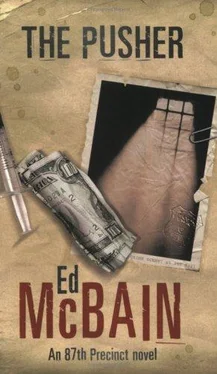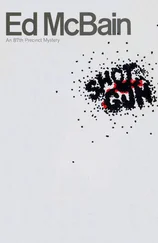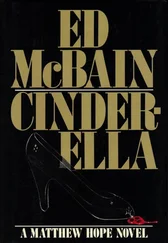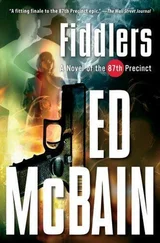Ed McBain - Pusher
Здесь есть возможность читать онлайн «Ed McBain - Pusher» весь текст электронной книги совершенно бесплатно (целиком полную версию без сокращений). В некоторых случаях можно слушать аудио, скачать через торрент в формате fb2 и присутствует краткое содержание. Жанр: Полицейский детектив, на английском языке. Описание произведения, (предисловие) а так же отзывы посетителей доступны на портале библиотеки ЛибКат.
- Название:Pusher
- Автор:
- Жанр:
- Год:неизвестен
- ISBN:нет данных
- Рейтинг книги:4 / 5. Голосов: 1
-
Избранное:Добавить в избранное
- Отзывы:
-
Ваша оценка:
- 80
- 1
- 2
- 3
- 4
- 5
Pusher: краткое содержание, описание и аннотация
Предлагаем к чтению аннотацию, описание, краткое содержание или предисловие (зависит от того, что написал сам автор книги «Pusher»). Если вы не нашли необходимую информацию о книге — напишите в комментариях, мы постараемся отыскать её.
Pusher — читать онлайн бесплатно полную книгу (весь текст) целиком
Ниже представлен текст книги, разбитый по страницам. Система сохранения места последней прочитанной страницы, позволяет с удобством читать онлайн бесплатно книгу «Pusher», без необходимости каждый раз заново искать на чём Вы остановились. Поставьте закладку, и сможете в любой момент перейти на страницу, на которой закончили чтение.
Интервал:
Закладка:
"What hospital?" Willis asked.
"General," Temple said. "Call in later, will you? This looks pretty serious."
"How so?" Meyer asked.
"It may turn into a homicide."
Meyer had never liked the smell of hospitals. His mother had died of cancer in a hospital, and he would always remember her pain-wracked face, and he would always remember the smells of sickness and death, the hospital smells that had invaded his nostrils and entrenched themselves there forever.
He did not like doctors, either. His dislike of doctors probably had its origin in the fact that a doctor had originally diagnosed his mother's malignant cancer as a sebaceous cyst. But aside and apart from this indisputably prejudiced viewpoint, he also found doctors unbearably conceited and possessed of, to Meyer, a completely unwarranted sense of self-importance. Meyer was not a man to scoff at education. He himself was a college graduate who happened to be a cop. A medical man was a college graduate who happened to have a doctorate. The doctorate, in Meyer's mind, simply meant four years of additional schooling. These years of schooling, necessary before a physician could begin practice, were akin to the years of apprenticeship any man had to serve in any given field before he became a success in that field. Why then did most doctors feel superior to, for example, advertising men? Meyer would never understand it.
He supposed it broke down to the basic drive for survival. A doctor allegedly held survival in his hands. Meyer's impression, however, was that the physicians had inadvertently and quite unconsciously correctly labeled the pursuit of their chosen profession: practice. As far as Meyer was concerned, all doctors were doing just that: practicing. And until they got perfect, he would stay away from them.
Unfortunately the intern in whose hands the life of Maria Hernandez lay did not help to raise Meyer's opinion of medical men in general.
He was a young boy with bright blond hair clipped close to his scalp. His eyes were brown, and his features were regular, and he looked very handsome and very clean in his hospital tunic. He also looked very frightened. He had perhaps seen cut-up cadavers in medical school, but Maria Hernandez was the first live person he'd seen so mutilated. He stood in the hospital corridor, puffing nervously on a cigarette, talking to Meyer and Willis.
"What's her condition now?" Willis asked.
"Critical," the young doctor said.
"How critical? How much longer has she got?"
"That's… that's hard to say. She's… she's very badly cut. We've… we've managed to stop the blood, but there was so much loss before she got to us…" The Doctor swallowed. "It's hard to say."
"May we talk to her, Doctor Fredericks?" Meyer asked.
"I… I don't think so."
"Can she talk?"
"I… I don't know."
"For Christ's sake, pull yourself together!" Meyer said irritably.
"I beg your pardon?" Fredericks said.
"If you have to vomit, go ahead," Meyer said. "Then come back and talk sensibly."
"What?" Fredericks said. "What?"
"All right, listen to me," Meyer said very patiently. "I know you're in charge of this great big shining hospital, and you're probably the world's foremost brain surgeon, and a little Puerto Rican girl bleeding her guts out over your floors is an inconvenience. But—"
"I didn't say—"
"But," Meyer continued, "it so happens that someone stabbed that little girl, and our job is to find whoever did it so that it won't happen again and cause you further inconvenience. A dying declaration is competent evidence. If the person has no hope of recovery, and if we get a declaration, the courts will admit it. Now—is that little girl going to live, or isn't she?"
Fredericks seemed stunned.
"Is she?"
"I don't think so."
"Then may we talk to her?"
"I would have to check that."
"Well then, would you please, for the love of God, go check it?"
"Yes. Yes, I'll do that. You understand, the responsibility is not mine. I couldn't grant permission for questioning the girl without check—"
"Go, go, already," Meyer said. "Check. Hurry."
"Yes," Fredericks said, and he hurried off down the corridor in a fury of sudden starched energy.
"You know the questions we're supposed to ask?" Willis said. "To make this admissible?"
"I think so. You want to run over them?"
"Yeah, we'd better. I think we should get a stenographer up here, too."
"Depends on how much time there is. Maybe there's a loose secretary hanging around the hospital. A police stenographer would take—"
"No, not enough time for that. We'll ask Fredericks if someone can take shorthand. Think she'll be able to sign?"
"I don't know. What about the questions?"
"The name and the address first," Willis said.
"Yes. Then, Do you now believe that you are about to die?"
"Yeah," Willis said. "What comes next?"
"Jesus, I hate this, you know?" Meyer said.
"Something about Do you hope to recover…?"
"No, no, it's Have you no hope of recovery from the effects of the injury you have received?" Meyer shook his head. "Jesus, I hate this."
"And then the business about Are you willing to make a true statement of how you received the injury from which you are now suffering ? That's all of it, isn't it?"
"Yes," Meyer said. "Jesus, that little girl in there…"
"Yeah," Willis said. Both men fell silent. They could hear the quiet thrum of the hospital all around them, like a giant white heart pumping blood. In a little while, they heard footsteps echoing down the corridor.
"Here's Fredericks now," Willis said.
Dr. Fredericks approached them. He was sweating, and his tunic looked rumpled and soiled.
"How about it?" Meyer said. "Did you get us permission?"
"It doesn't matter," Fredericks said.
"Huh?"
"The girl is dead."
Chapter Eleven
Because the room in which Maria Hernandez kept her fatal assignation with a person or persons unknown was the last known place to have enclosed her murderer, it was open to particular scrutiny by the police.
This scrutiny was of a non-theoretical nature. The laboratory technicians who descended upon the premises were not interested in exercising their imaginations. They were interested solely in clues that might lead to the identity of the person or persons who had wantonly slashed and murdered the Hernandez girl. They were looking for facts. And so, after the room had been sketched and photographed, they got down to business, and their business was a slow and laborious one.
Chance impressions are, of course, fingerprints.
The three kinds of chance impressions are:
Latent prints—these are invisible. Sometimes they can be picked up with the naked eye unaided, provided they are on a smooth surface and provided indirect lighting is used.
Visible prints—which happen to be visible only because the person who left them behind was a slob. And, being a slob, he'd allowed his fingers to become smeared with something containing color. The color was usually provided by dirt or blood.
Plastic prints—which, as the definition implies, are left in some sort of a plastic material like putty, wax, tar, clay, or the inside of a banana peel.
Naturally, plastic prints and visible prints are the nicest kinds of chance impressions to find. At least, they entail the least amount of location work. But chance impressions being what they are—that is, fingerprints inadvertently and unconsciously left behind—the person leaving them is not always so considerate as to leave the easiest kind to find. Most chance impressions are latent prints, and latent prints must be made visible through the use of fine-grained, lumpless powders before they can be photographed or transferred on foils. This takes time. The lab boys had a lot of time, and they also had a lot of latents to play around with. The room in which Maria Hernandez had been slashed, you see, was a room used to the steady going and coming of men. Patiently, slowly, the lab boys dusted and dusted, and photographed and transferred, coming up with a total of ten different men who had left good clear latents around the room.
Читать дальшеИнтервал:
Закладка:
Похожие книги на «Pusher»
Представляем Вашему вниманию похожие книги на «Pusher» списком для выбора. Мы отобрали схожую по названию и смыслу литературу в надежде предоставить читателям больше вариантов отыскать новые, интересные, ещё непрочитанные произведения.
Обсуждение, отзывы о книге «Pusher» и просто собственные мнения читателей. Оставьте ваши комментарии, напишите, что Вы думаете о произведении, его смысле или главных героях. Укажите что конкретно понравилось, а что нет, и почему Вы так считаете.












